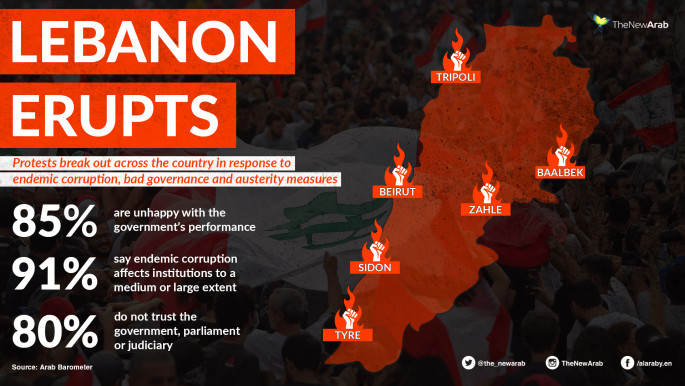Lebanon hospital crisis puts lives at risk, warns HRW
Hospitals may soon be unable to provide surgical services that save patients' lives and medical care amid a worsening financial crisis, a report by Human Rights Watch said.
The crisis, which stems from the government's failure to reimburse private and public hospitals, is making it difficult to pay staff and purchase medical supplies.
"The Lebanese government's failure to pay its bills to medical facilities seriously endangers the health of the population," said Joe Stork, deputy Middle East director at Human Rights Watch.
"While politicians horse-trade over a new cabinet, the government is not responding to the desperate economic situation in the country and the clock is ticking on the ability of many doctors and hospitals to treat patients."
The finance ministry owes private hospitals an estimated $1.3 billion since 2011, according to Sleiman Haroun, the head of the Syndicate of Private Hospitals.
The ministry disbursed most of the funds owed up until 2017, Haroun said, but private hospitals received only half of what was owed them in 2018 and not a single payment in 2019.
Private hospitals account for 82 percent of Lebanon's healthcare capacity.
Public hospitals also have not been receiving payments from the government.
Twitter Post
|
Officials at the Rafik Hariri University Hospital in Beirut and the Hermel Public Hospital in the Bekaa Valley told Human Rights Watch that the government has not made any payments in 2019.
The health sector is passing through "a very serious crisis" because doctors are facing a shortage of foreign medication and equipment, Haroun told the AP.
Importers of medical products have been saying since September that they have not been able to buy new stocks, Haroun said.
This is causing shortages in urgently needed material, including stents for hearts, filters for kidney and blood bags, he added.
A dollar shortage has also restricted the import of vital goods and led banks to curtail credit lines.
Lebanon imports most of the basic needs such as medicine, fuel, wheat and medical products.
The companies that import medical products have been unable to import since last September, according to Aya Majzoub, researcher in the Middle East and North Africa division of Human Rights Watch.
This is exacerbating the crisis in providing medicine and causing a lack of important products in hospitals such as "stents, heart filters and blood bags", Majzoub said.
Lebanon has been gripped by unprecedented cross-sectarian protests since 17 October, denouncing perceived official mismanagement and corruption.
 |





 Follow the Middle East's top stories in English at The New Arab on Google News
Follow the Middle East's top stories in English at The New Arab on Google News
![Israeli forces ordered bombed Gaza's Jabalia, ordering residents to leave [Getty]](/sites/default/files/styles/image_330x185/public/2176418030.jpeg?h=a5f2f23a&itok=_YGZaP1z)

